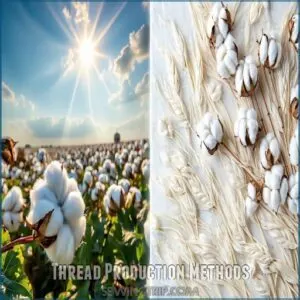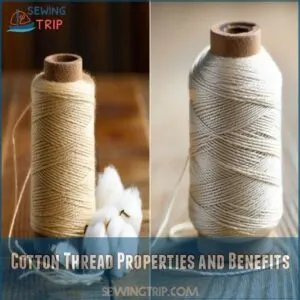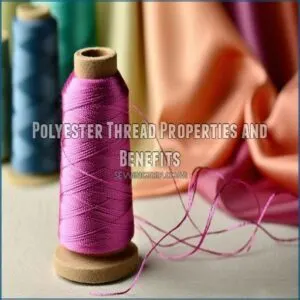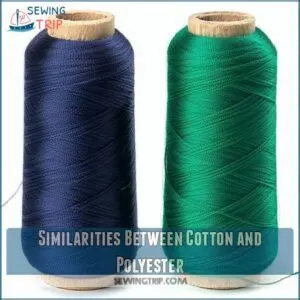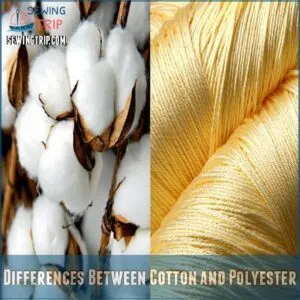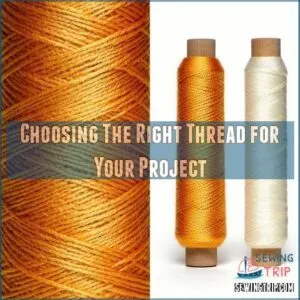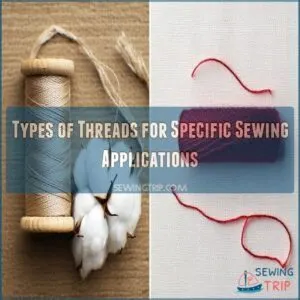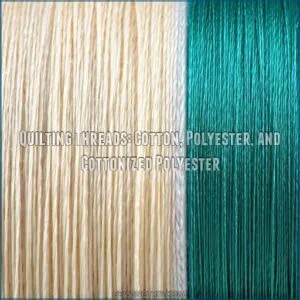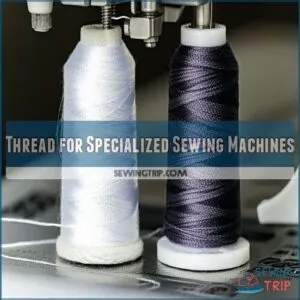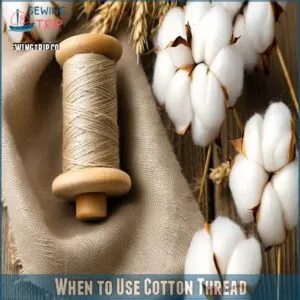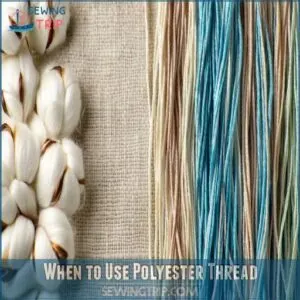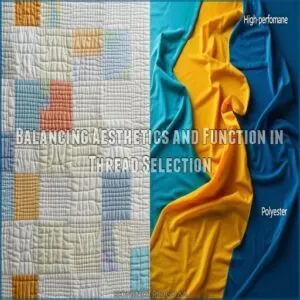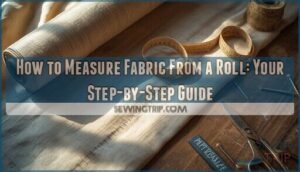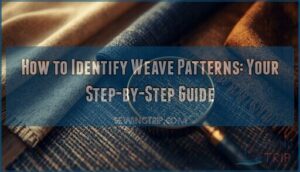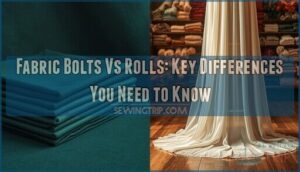This site is supported by our readers. We may earn a commission, at no cost to you, if you purchase through links.
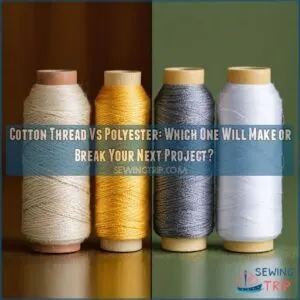
Cotton’s your go-to for natural softness and heat resistance – perfect for those heirloom quilts you’ll pass down to the grandkids.
Polyester brings stretch and strength to the table, plus it won’t break the bank.
Cotton rocks a classic matte finish but won’t budge an inch, while polyester flexes its muscles with durability and a bit of shine.
Both’ll give you sturdy seams, and they come in enough colors to make a rainbow jealous.
Just wait until you discover how matching the right thread to your fabric can transform your next masterpiece.
Table Of Contents
- Key Takeaways
- Thread Production Methods
- Key Properties of Cotton and Polyester Threads
- Comparison of Cotton and Polyester Threads
- Choosing The Right Thread for Your Project
- Types of Threads for Specific Sewing Applications
- Quilting Threads: Cotton, Polyester, and Cottonized Polyester
- Thread for Specialized Sewing Machines
- When to Use Cotton Thread
- When to Use Polyester Thread
- Balancing Aesthetics and Function in Thread Selection
- Frequently Asked Questions (FAQs)
- Conclusion
Key Takeaways
- You’ll discover that cotton thread offers natural softness and heat resistance, making it ideal for heirloom projects, while polyester provides strength, stretch, and affordability for everyday wear.
- Cotton thread produces a classic matte finish and is perfect for natural fabrics, whereas polyester thread is versatile with its sheen and durability, well-suited for synthetics and stretchy materials.
- Polyester thread creates less tension on fabric due to its elasticity, helping you avoid puckering, and it generates minimal lint, reducing sewing machine maintenance.
- When selecting thread, consider your project needs: cotton works best for delicate, natural projects, and polyester is your go-to for items requiring strength and flexibility.
Thread Production Methods
You’ll find that cotton thread starts its journey in nature’s fields before it’s cleaned, combed, and twisted into the perfect strand for your sewing needs.
Meanwhile, your polyester thread begins as petroleum in a factory, where it’s transformed into chips and spun into strong filaments that’ll handle whatever project you throw at it.
Cotton Thread Production Process
From field to spool, cotton thread’s journey starts with careful farming and harvesting.
The raw cotton gets combed and cleaned, removing debris and short fibers.
To produce high-quality cotton threads, manufacturers often rely on specialized equipment and tools, which can be found through cotton thread production.
Through a series of precise rollers, these natural fibers are twisted and spun into thread before getting a final treatment with caustic soda.
- Watch in awe as nature’s finest fibers transform into your crafting companion
- Feel the satisfaction of choosing eco-friendly materials for your projects
- Experience the legacy of traditional cotton production methods
Polyester Thread Production Process
The magic of polyester thread starts in a lab, not a field.
Imagine this: modified petroleum gets transformed into tiny chips, then melted and spun into super-fine filaments, a process known as polyester thread production.
These filaments are stretched like taffy and cut to keep only the strongest fibers.
Key Properties of Cotton and Polyester Threads
You’ll need to know what makes these threads tick before you pick one for your next masterpiece, just like you wouldn’t wear flip-flops to run a marathon.
Cotton and polyester threads each bring their own superpowers to your sewing table.
Understanding their unique properties will help you choose the perfect match for your fabric.
Cotton Thread Properties and Benefits
Now that you’ve seen how cotton thread comes to life, let’s talk about what makes it special. Your natural cotton thread brings three game-changing benefits to your sewing table:
- Cotton’s natural softness feels like a cozy blanket against your fabric
- Heat resistance means it won’t melt under your iron’s warmth
- Perfect for heirloom projects – it ages beautifully, getting softer without losing strength
Polyester Thread Properties and Benefits
While cotton brings its natural charm, polyester thread packs quite a punch in your sewing toolkit.
You’ll love its impressive stretch factor and minimal lint production, which can be easily maintained with the right polyester sewing supplies, perfect for keeping your bobbin running smoothly.
It’s tough as nails, plays nice with various fabrics, and won’t break the bank.
Plus, its strength makes it a go-to choice for everyday clothing projects that need to withstand frequent wear and tear.
Comparison of Cotton and Polyester Threads
You’ll find that cotton and polyester threads are like the superheroes of your sewing kit, each bringing its own special powers to your projects.
Cotton threads offer that cozy, natural feel perfect for heirloom pieces and quilting.
Polyester threads pack a punch with their stretch and durability that’ll keep your everyday garments looking fresh.
Similarities Between Cotton and Polyester
Both cotton and polyester threads share surprising common ground in their versatility and reliability.
They’ll both give you strong, durable seams that can withstand regular wear and tear.
You’ll find both types work smoothly in most modern sewing machines, and they’re both readily available in a rainbow of colors.
Understanding the thread weight and fiber content, as outlined in a detailed sewing threads guide, can help you make an informed decision between the two.
Plus, they each come in various weights and thicknesses to suit different project needs.
Differences Between Cotton and Polyester
Despite their shared purpose, cotton and polyester threads are as different as silk and sandpaper.
When you’re picking between these two workhorses of the sewing world, here’s what sets them apart:
- Cotton gives you that classic matte finish and zero stretch, perfect for heirloom projects, but it’ll cost you more and create more lint
- Polyester brings strength and stretch to the table, plus it’s budget-friendly
- Thread sheen is where polyester shines (literally), while cotton keeps things subtle
Choosing The Right Thread for Your Project
You’ll save yourself hours of frustration (and maybe a few broken needles) by matching your thread type to your project’s unique needs.
Whether you’re working with stretchy workout gear or creating an heirloom quilt that’ll last generations, understanding the differences between cotton and polyester threads will help you nail that perfect stitch every time.
Factors to Consider When Selecting Thread
Choosing the right thread feels like picking the perfect dance partner for your fabric. Here’s a quick guide to help you make the perfect match:
| Factor | Cotton Thread | Polyester Thread |
|---|---|---|
| Project Type | Quilting, heirloom | Everyday wear |
| Fabric Match | Natural fabrics | Synthetics/stretch |
| Heat Tolerance | High resistance | Can melt |
| Cost-Benefit | Premium price, natural feel | Budget-friendly, versatile |
Let’s get real—your thread choice can make or break your project’s success.
Think about what your fabric needs, not just what’s sitting in your sewing box.
Thread Quality and Weight Considerations
When you’re eyeing thread options, quality and weight can make the difference between smooth sailing and a sewing nightmare.
High-end brands like Coats & Clark, Mettler, and Gutermann offer superior strength with minimal shedding, while cheaper threads often break and snag.
For everyday projects, stick to 40 or 50wt threads.
Remember: higher numbers mean thinner threads, and those chunky 18wt options might overwhelm your machine.
Types of Threads for Specific Sewing Applications
You’ll need different threads for different sewing jobs, just like you wouldn’t wear flip-flops to climb a mountain.
Whether you’re working on a quilting masterpiece or stitching up some heavy-duty upholstery, specialty threads are designed to handle everything from delicate silk to tough denim.
General Purpose Threads and Alternatives
Most general purpose threads today are 100% polyester, striking a sweet spot between strength and versatility.
Think of it as your trusty Swiss Army knife – it’ll handle everything from delicate silk gauze to sturdy denim with ease.
When you’re setting up for construction seams or everyday sewing, this all-rounder pairs perfectly with needle sizes 70-100 and delivers a smooth, shiny finish.
Specialty Threads for Unique Projects
Those special projects in your sewing room deserve threads that are just as unique as your vision. Here’s a rundown of specialty threads that’ll take your creations to the next level:
- Silk thread glides smoothly through delicate fabrics, perfect for hand sewing
- Linen thread stands up to friction like a champ
- Tacking thread makes temporary stitches a breeze
- Extra-fine thread works wonders on delicate details
- Embroidery floss adds that perfect handcrafted touch
Heavy-Duty and Decorative Threads
Every sewing project deserves the right thread for the job, especially when you’re tackling heavy-duty or decorative work.
Here’s a quick guide to help you pick the perfect thread for your next masterpiece:
| Thread Type | Best Uses | Special Features |
|---|---|---|
| Topstitch | Decorative finishes | Extra visible, strong |
| Metallic | Embellishments | Sparkly, eye-catching |
| Upholstery | Furniture, bags | Super strong, durable |
| Jeans/Denim | Heavy fabrics | Cotton-wrapped polyester |
Quilting Threads: Cotton, Polyester, and Cottonized Polyester
You’ll feel like a quilting superhero when you understand how cotton threads give you that classic matte finish, while polyester offers strength and cottonized polyester brings you the best of both worlds.
Whether you’re stitching together a family heirloom or whipping up a quick project, choosing the right quilting thread is like picking the perfect sidekick for your creative journey.
cotton threads, polyester, and cottonized polyester offer different qualities.
Cotton Quilting Threads: Benefits and Drawbacks
Traditional quilters swear by cotton thread, and for good reason.
When you’re piecing together those intricate patterns, cotton’s zero stretch factor helps prevent those pesky puckers that can ruin your design.
It’s got a beautiful matte finish that blends seamlessly with natural fabrics, though you’ll pay a bit more for these benefits.
Perfect for heirloom projects, cotton thread’s durability stands the test of time.
Polyester Quilting Threads: Benefits and Drawbacks
Switching from cotton to polyester quilting thread can feel like upgrading from a bicycle to an e-bike – it’s stronger, smoother, and often cheaper. You’ll notice the difference in your next project, especially when working with modern fabrics.
- 100wt polyester thread is stronger than its cotton equivalent
- Creates flatter seams perfect for precise piecing
- Produces minimal lint, keeping your machine happy
- Available at a lower price point than cotton options
Cottonized Polyester Quilting Threads: Benefits and Drawbacks
Looking for the sweet spot between cotton and polyester? Cottonized polyester threads give you the best of both worlds.
They’re treated to remove stretch like cotton, but maintain polyester’s strength and minimal lint.
You’ll love their matte finish that blends seamlessly with fabrics, though they do have a bit more shine than pure cotton.
Available in various sizes, they’re perfect for quilters seeking reliability without compromising on aesthetics.
Thread for Specialized Sewing Machines
You’ll need specialized threads like bobbin fill and wooly nylon if you’re working with machines that do more than just straight stitches.
Whether you’re using a serger that needs fluffy thread or working with an embroidery machine that demands specific bobbin thread, choosing the right specialized thread can mean the difference between professional results and a tangled mess.
Bobbin Fill Thread and Its Uses
When you’re aiming for that perfect stitch, bobbin fill thread becomes your secret weapon in the sewing room.
This extra-fine polyester thread, similar to standard sewing thread but thinner, works magic in your bobbin.
It reduces bulk in seams while maintaining strength, making it perfect for lightweight fabrics and detailed work.
Plus, you’ll save money since it stretches further than regular thread.
Serger/Overlocker Thread and Its Uses
Your serger’s hungry for thread that’s fluffy and less twisted than regular sewing thread. While it might seem like any thread would do, sergers need special thread that can handle high speeds without breaking or creating a mess.
- Comes in larger cones for longer sewing sessions
- Specially designed to be weaker than all-purpose thread
- Creates balanced, professional-looking seams
- Perfect for rolled hems and decorative edges
Wooly Nylon Thread and Its Uses
Anyone who’s struggled with stretchy fabrics knows the game-changer that wooly nylon thread can be.
When working with ripstop nylon fabrics, this multifilament superstar brings incredible elasticity and softness to your projects, making it perfect for lingerie, swimwear, and activewear.
You’ll love how it creates beautifully flat seams with excellent coverage, especially in serged edges.
Just remember to use it in your serger’s loopers rather than needles for best results.
When to Use Cotton Thread
You’ll want to reach for cotton thread when you’re working with natural fabrics like cotton, linen, or silk, since it plays nicely with these materials and creates beautifully smooth seams.
If you’re crafting an heirloom project that needs to stand the test of time, cotton thread’s durability and heat resistance make it your perfect partner in crime.
Projects That Require Natural Fibers
Natural fiber projects call for natural thread choices, and cotton thread matches perfectly with organic fabrics like linen, wool, and hemp.
For the best results, consider investing in high-quality cotton sewing supplies.
If you’re sewing with eco-friendly or naturally dyed materials, cotton thread complements their unique properties and aging characteristics.
Plus, it takes natural dyes beautifully, making it ideal for projects where you want to create your own custom-colored threads with plant-based dyes.
Heirloom Projects and Cotton Thread
For cherished heirloom projects that’ll be passed down through generations, cotton thread is your secret weapon.
It ages gracefully alongside natural fabrics, maintaining its strength and colorfastness over decades.
Unlike polyester, cotton thread’s durability shines in quilts, christening gowns, and family keepsakes.
Plus, its gentle properties won’t damage delicate vintage materials, ensuring your masterpiece stands the test of time.
When to Use Polyester Thread
You’ll love polyester thread for its incredible versatility when you’re working with stretchy fabrics or need extra durability in your everyday projects.
When you’re tackling anything from yoga pants to backpack repairs, this synthetic powerhouse won’t let you down.
Its superior strength and excellent stretch recovery are key benefits.
Projects That Require Stretch and Durability
Stretchy fabric projects need a thread that can keep up with every twist and bend. When you’re working with activewear, swimsuits, or anything that needs to move, polyester thread is your best friend.
Here’s where polyester thread shines:
- Perfect for yoga pants and workout gear that stretch in every direction
- Ideal for kids’ clothes that take daily abuse
- Great for upholstery pieces that need lasting strength
- Essential for swimwear that faces chlorine and sun
Machine Sewing and Polyester Thread
Your sewing machine‘s best friend? Polyester thread, hands down.
Here’s why it’s the go-to choice for machine sewing: when working with polyester thread, it’s vital to set the thread tension based on the fabric and thread type to get the best results.
| Feature | Benefit | Machine Impact |
|---|---|---|
| Low Lint | Cleaner Bobbin | Less Maintenance |
| Even Texture | Smooth Feed | Consistent Tension |
| Strong Fiber | Minimal Breaks | Faster Sewing |
When you’re ready to tackle projects at high speeds, polyester thread’s durability and consistent performance will keep your machine humming along without those frustrating snags or breaks.
Balancing Aesthetics and Function in Thread Selection
You’ll need to juggle both the look and performance of your thread just like you’d pick the perfect pair of shoes for a marathon or a wedding.
While cotton brings that classic, matte finish perfect for heirloom quilts,
polyester’s strength and shine might be your best bet for that stretchy workout gear you’re planning to sew.
Considering The Desired Look and Feel
The perfect thread choice isn’t just about strength – it’s about creating that "wow" factor in your finished piece.
Think about how thread sheen can make or break your project’s overall look.
- Cotton’s matte finish creates a subtle, sophisticated vibe
- Polyester’s natural shine adds a modern pop
- Thread texture affects how light plays across your stitches
- Color depth varies between fiber types
- Stitch definition shows differently on each thread type
Choosing The Right Thread for The Job
Picking the perfect thread isn’t rocket science – it’s all about matching your project’s needs with the right features.
When choosing thread for quilting, consider factors such as thread weight and count, as discussed in thread weight and count guidelines, to guarantee the perfect stitch.
Here’s a quick guide to help you nail your thread choice every time:
| Project Type | Thread Choice | Thread Weight | Key Benefits | Best For |
|---|---|---|---|---|
| Delicate fabrics | Cotton | 50-60 wt | Soft, natural feel | Heirloom pieces |
| Stretchy clothes | Polyester | 40-50 wt | Flexibility | Daily wear |
| Heavy fabrics | Poly-wrapped | 30-40 wt | Extra strength | Upholstery |
| Decorative work | Metallic/specialty | 30-40 wt | Visual appeal | Embellishments |
| Quilting | Cotton or poly | 50 wt | Even stitches | Piecing/quilting |
Frequently Asked Questions (FAQs)
Which is better for sewing cotton or polyester thread?
Both thread types shine in different situations.
Polyester offers strength and versatility for everyday sewing.
Cotton’s your go-to for natural fabrics and heirloom projects.
Consider your fabric and project needs when choosing.
When should you use cotton thread?
When threading the needle, use cotton thread for natural fabric projects like quilts or heirlooms.
Its lack of stretch is ideal for creating long-lasting seams.
It adds a traditional touch that feels oh-so classic.
What are the pros and cons of polyester thread?
Polyester thread is strong, versatile, and works well with various fabrics.
It’s stretchy, making it ideal for clothing, and produces minimal lint.
However, it lacks the natural feel of cotton and can be too shiny for some projects.
What is the best thread to use for sewing?
Go for polyester thread if you want versatility and strength—it handles most fabrics like a champ.
Cotton thread’s your best bet for natural fabrics and heirloom pieces.
Choose based on your project’s fabric and desired finish!
How long does each type of thread last?
Imagine a thread enduring endless stitches.
Cotton lasts about a decade in normal conditions, while polyester can outlive you, resisting time and elements.
Polyester’s synthetic strength makes it a long-term partner for your sewing projects.
Can you wash garments with different thread types together?
Sure, mixing garments with different thread types in the wash is fine.
Just remember to stick with the fabric care instructions, as the threads typically hold up well.
Toss them together without worries about damage from normal washing.
Which thread creates less tension on fabric?
Polyester thread creates less tension on fabric due to its elasticity.
It’s stretchy, making it ideal for clothing that needs give.
If you want to avoid puckering or tension issues, polyester might be your best bet.
Do thread colors fade differently between materials?
Let’s get this straight: Yes, absolutely!
Thread color fading depends heavily on dye quality and fiber type.
Sunlight and washing affect both cotton and polyester differently.
Some colors, like bright reds, are notoriously fickle.
What temperature settings work best for each thread?
When sewing, keep cotton thread settings around 300°F for ironing; it loves a medium-heat environment.
Polyester thread, being more flexible, prefers cooler settings, maxing at 275°F, making it versatile and less prone to damage.
Conclusion
Choosing between cotton thread and polyester boils down to what you want in your project: the natural vibe of cotton or the stretch and shine of polyester.
Each offers unique perks, like cotton’s comfort for heirlooms or polyester’s toughness for everyday wear.
Ask yourself what your fabric demands—elegance or endurance.
However you thread the needle, understanding cotton thread vs polyester guarantees your next creation isn’t just another project, but a masterpiece in the making.

